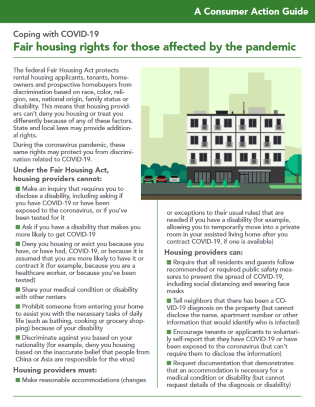Fair housing rights for those affected by the pandemic
Coping with COVID-19
The federal Fair Housing Act protects rental housing applicants, tenants, homeowners and prospective homebuyers from various forms of discrimination. This publication explains how these same rights may protect you from discrimination related to the COVID-19 pandemic, and the steps to take if you do experience discrimination.

Publication Series
- This publication is part of the COVID-19 Educational Resources training module.
Download File
PDF files may contain outdated links.
Fair housing rights for those affected by the pandemic
File Name: Housing_COVID_2020_EN.pdf
File Size: 0.06MB
Languages Available
Table of Contents
The federal Fair Housing Act protects rental housing applicants, tenants, homeowners and prospective homebuyers from discrimination based on race, color, religion, sex, national origin, family status or disability. This means that housing providers can’t deny you housing or treat you differently because of any of these factors. State and local laws may provide additional rights.
During the coronavirus pandemic, these same rights may protect you from discrimination related to COVID-19.
Under the Fair Housing Act, housing providers cannot:
- Make an inquiry that requires you to disclose a disability, including asking if you have COVID-19 or have been exposed to the coronavirus, or if you’ve been tested for it
- Ask if you have a disability that makes you more likely to get COVID-19
- Deny you housing or evict you because you have, or have had, COVID-19, or because it is assumed that you are more likely to have it or contract it (for example, because you are a healthcare worker, or because you’ve been tested)
- Share your medical condition or disability with other renters
- Prohibit someone from entering your home to assist you with the necessary tasks of daily life (such as bathing, cooking or grocery shopping) because of your disability
- Discriminate against you based on your nationality (for example, deny you housing based on the inaccurate belief that people from China or Asia are responsible for the virus)
Housing providers must:
- Make reasonable accommodations (changes or exceptions to their usual rules) that are needed if you have a disability (for example, allowing you to temporarily move into a private room in your assisted living home after you contract COVID-19, if one is available)
Housing providers can:
- Require that all residents and guests follow recommended or required public safety measures to prevent the spread of COVID-19, including social distancing and wearing face masks
- Tell neighbors that there has been a COVID-19 diagnosis on the property (but cannot disclose the name, apartment number or other information that would identify who is infected)
- Encourage tenants or applicants to voluntarily self-report that they have COVID-19 or have been exposed to the coronavirus (but can’t require them to disclose the information)
- Request documentation that demonstrates that an accommodation is necessary for a medical condition or disability (but cannot request details of the diagnosis or disability)
Filing a housing discrimination complaint
The U.S. Department of Housing and Urban Development (HUD) is the federal agency responsible for enforcing the Fair Housing Act. If you believe you have experienced housing discrimination, file a complaint with HUD's Office of Fair Housing and Equal Opportunity online, via email, by phone (800-669-9777/TTY: 800-877-8339) or by mail. Get details, including links to multilingual complaint forms, at the HUD website.
This page on the HUD website provides an overview of the complaint and investigation process.
Housing discrimination complaints may be filed for up to one year after the discriminatory housing practice occurs or ends, but it’s best to file your complaint as soon as possible.
Resources and assistance
Learn what the Fair Housing Act says, in a consumer-friendly format, at HUD.gov.
Not sure if you’re being discriminated against? HUD offers some examples of housing discrimination that will help you recognize it.
You have the right to sue your landlord for discrimination, even if you have filed a complaint with HUD. Find out about the process and get tips about hiring a lawyer at the Nolo legal information website.
Find local fair housing and tenant rights organizations by clicking on your state on HUD’s Tenant Rights webpage. These groups can help you determine if you have been discriminated against and counsel you on your options.
Published / Reviewed Date
Published: June 02, 2020
Download File
Fair housing rights for those affected by the pandemic
File Name: Housing_COVID_2020_EN.pdf
File Size: 0.06MB
Sponsors
Notes
This guide was created as part of Consumer Action’s COVID-19 Educational Project.
Filed Under
Consumer Rights ♦ COVID-19 Pandemic ♦ Discrimination ♦ Housing ♦ Discrimination ♦ Tenant Rights ♦
Copyright
© 2020 –2024 Consumer Action. Rights Reserved.



